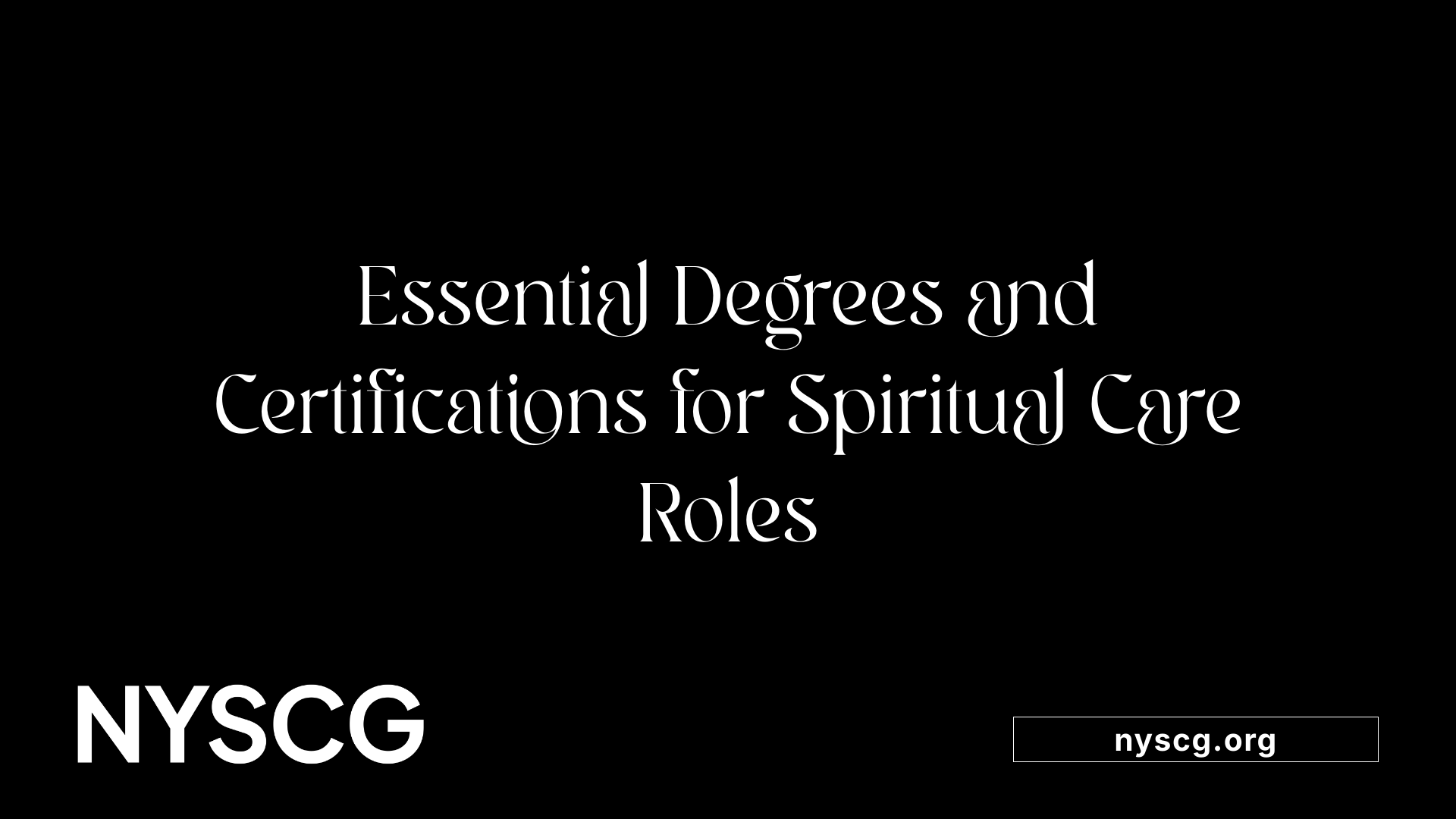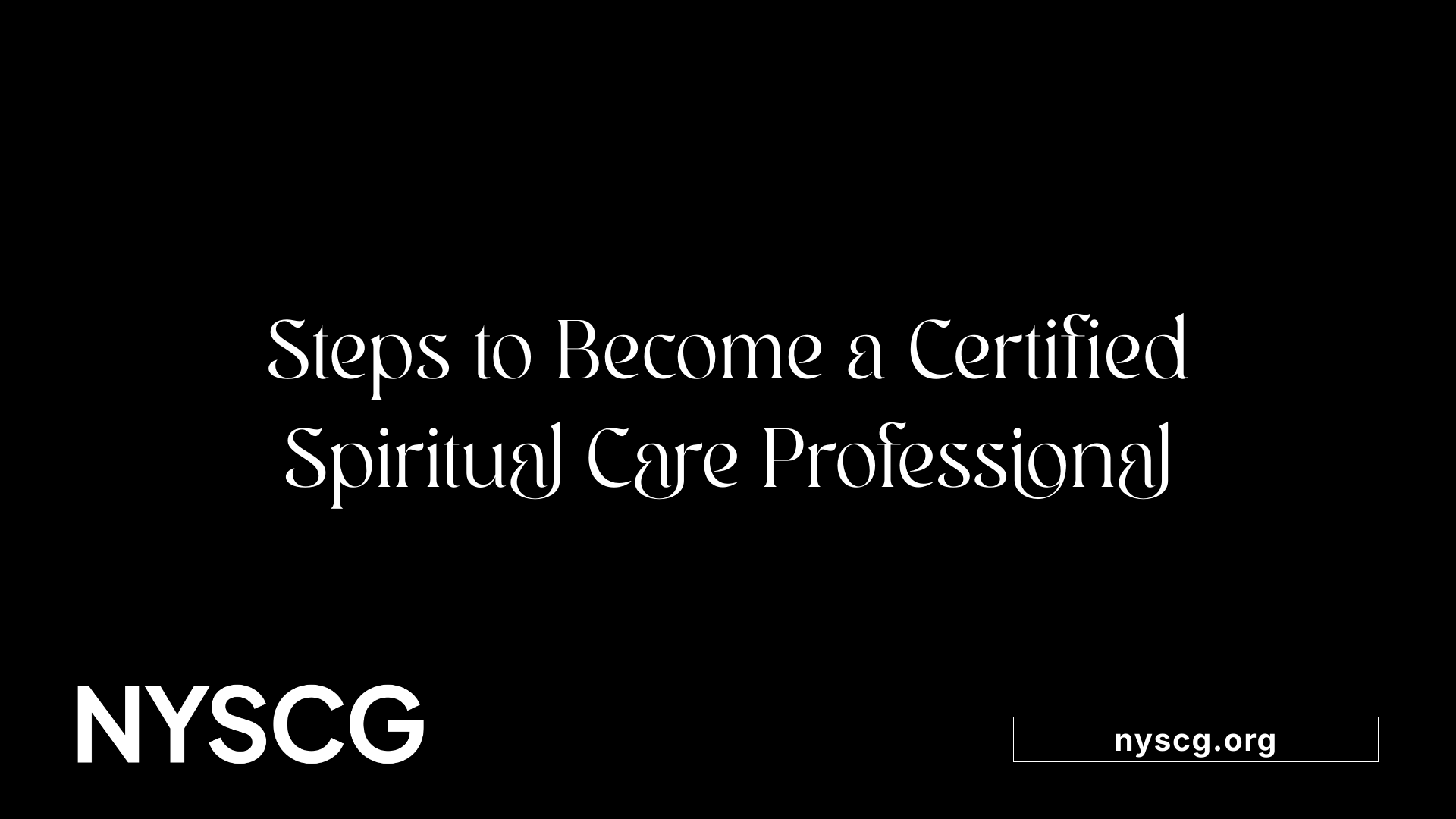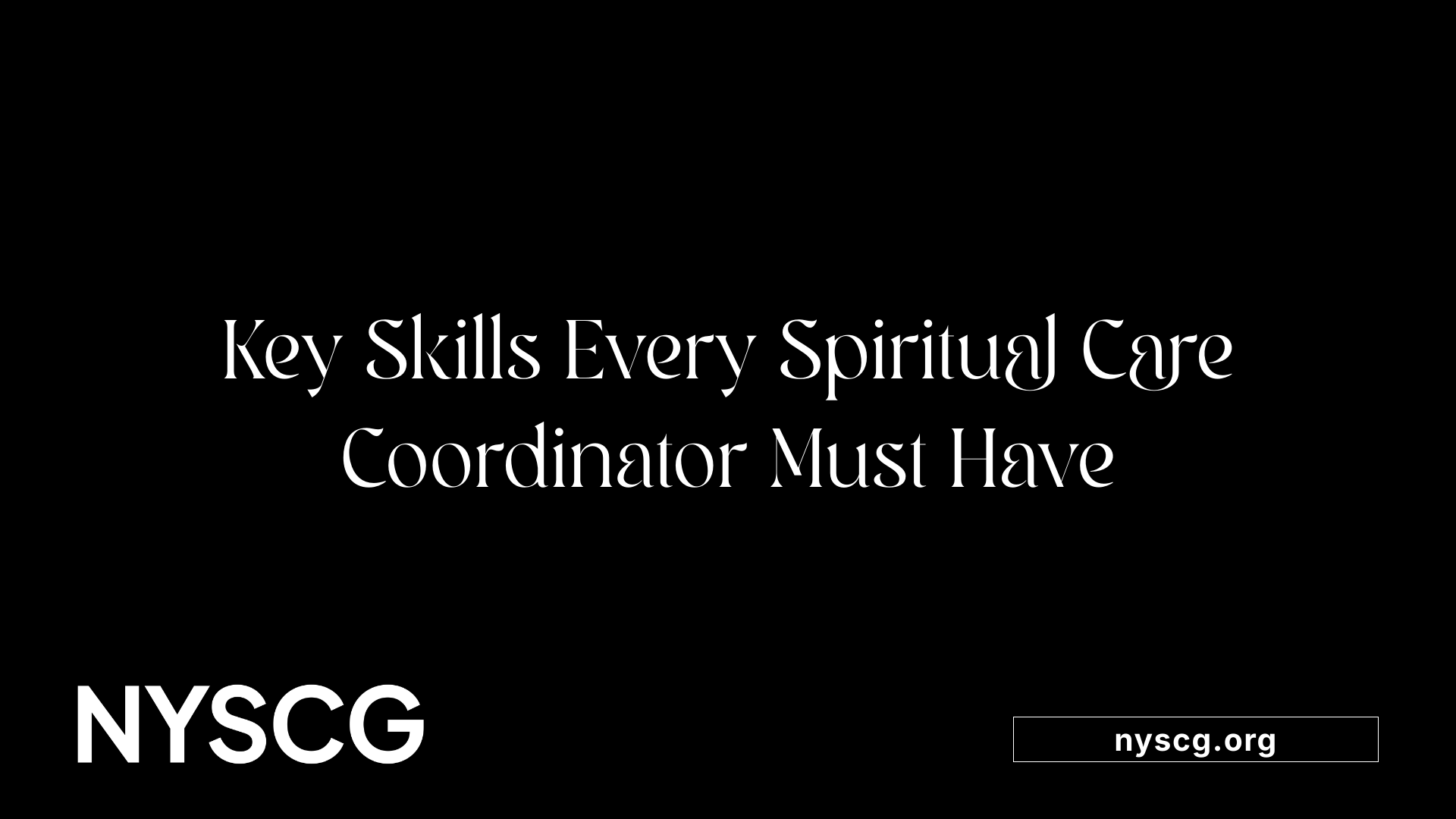How to Build a Career as a Spiritual Care Coordinator


Building a career as a spiritual care coordinator is a rewarding journey that combines educational achievement, practical experience, and compassionate engagement. This guide provides a comprehensive overview of the essential steps, skills, and pathways to establish yourself in this vital and growing field, offering opportunities to serve diverse communities and make meaningful contributions through spiritual and emotional support.

Entering the field of spiritual care generally demands a strong educational background combined with specialized clinical training. Most positions ask for at least a bachelor’s degree in areas such as religious studies, theology, counseling, psychology, or closely related fields. This foundational knowledge helps candidates understand diverse spiritual traditions and mental health principles.
For more advanced roles, especially those within hospitals, hospices, or military settings, a master’s degree is often essential. Common graduate degrees include the Master of Divinity (MDiv) or Master of Science in Spiritual Care. These programs focus on developing skills in pastoral counseling, ethics, sacred texts, and interfaith communication.
Practical experience is equally important. Completing Clinical Pastoral Education (CPE), which involves multiple supervised units, provides hands-on experience working directly with patients and families. This training helps candidates demonstrate their ability to provide compassionate spiritual and emotional support.
Professional certification is typically required for full qualification. Organizations like the National Association of Catholic Chaplains (NACC), Association of Professional Chaplains (APC), and others offer certifications that require coursework, work experience, and passing examinations. These credentials verify competency and adherence to ethical standards.
Overall, becoming a spiritual care provider involves a blend of academic learning, practical training, and certification, ensuring that professionals are well-prepared to serve diverse populations in sensitive healthcare environments.

Building a career in spiritual care or chaplaincy involves several educational and experiential steps. It typically begins with earning a relevant bachelor's degree, such as in religious studies, theology, or a related field. This foundational education provides essential knowledge of different faith traditions and spiritual care principles.
Following this, pursuing an advanced degree enhances qualifications. Many aspiring chaplains opt for a Master of Science in Spiritual Care, which offers specialized training in providing holistic support that addresses emotional, spiritual, and cultural needs. Some may choose a Master of Divinity (MDiv) or similar degrees, which focus on pastoral care, theology, and ministry skills.
Practical experience is vital. Gaining hands-on training through Clinical Pastoral Education (CPE), often consisting of supervised units, helps develop competence in real-life settings like hospitals, hospices, or military environments. These CPE units are a standard requirement for certification and employability.
Certification from respected professional organizations, such as the National Association of Catholic Chaplains (NACC) or the Association for Clinical Pastoral Education (ACPE), is often necessary. Certification involves completing coursework, supervised practice, and examinations to demonstrate ethical and professional standards.
Beyond formal education and certification, building a network within faith communities and healthcare institutions is crucial. Attending conferences, joining relevant associations, and participating in ongoing training and interfaith dialogues help foster professional growth and open career opportunities.
Most leaders in this field work across various settings like hospitals, hospices, or military services, often from diverse backgrounds. Continuous learning, relationship-building, and engagement with community resources are essential to thrive long-term in the profession.

A spiritual care coordinator must possess a range of skills to effectively serve patients, families, and the healthcare team. Empathetic listening and cultural sensitivity are foundational, allowing the coordinator to truly understand and respect diverse spiritual and emotional needs.
Effective communication skills are essential for building trust, facilitating conversations, and coordinating care across different stakeholders. Knowledge of various spiritual and cultural backgrounds helps tailor support appropriately, especially in a setting as diverse as hospice or hospital care.
Understanding ethics and setting clear boundaries are critical to maintain professionalism and ensure respectful, appropriate support. A spiritual care coordinator should also be capable of leadership and advocacy, promoting the integration of spiritual care into the broader healthcare plan.
Working collaboratively within an interdisciplinary team enhances the quality of care provided. This involves liaising with clergy, healthcare providers, and community resources to fulfill the holistic needs of patients.
In addition, staying informed about healthcare policies and developing skills in quality improvement can improve service delivery. Ongoing education and training enable coordinators to provide culturally sensitive, ethical, and impactful spiritual support.
Skill AreaDescriptionExample ActivitiesEmpathetic Listening & Cultural SensitivityRecognizing and respecting diverse beliefs and emotional statesConducting patient interviews, respecting beliefs during ritualsEffective CommunicationClearly conveying support and coordinating careFacilitating team meetings, educating staffSpiritual & Cultural KnowledgeDeep understanding of diverse traditionsParticipating in cultural competency trainingEthics & Boundary SettingMaintaining professionalism and respectEstablishing limits on scope of supportLeadership & AdvocacyPromoting spiritual care in healthcareDeveloping programs, lobbying for resources
Overall, success in this role hinges on combining compassionate interpersonal skills with professional expertise and a collaborative attitude.
A spiritual care coordinator plays a vital role in supporting patients, families, and healthcare staff by addressing spiritual and emotional needs. They provide compassionate counseling, helping individuals navigate complex feelings related to illness, loss, or hope.
Central to the role is conducting spiritual assessments. This involves understanding each person’s beliefs, values, and cultural backgrounds to tailor the support provided. Based on these assessments, coordinators facilitate rituals and ceremonies, such as blessings or memorial services, to mark significant life events or transitions.
Collaboration is essential. Coordinators work closely with medical teams to integrate spiritual care into overall treatment plans. They also liaise with community clergy and faith groups to strengthen support networks and ensure that spiritual practices adhere to patients’ traditions.
Developing and supervising spiritual care programs is another key responsibility. These programs may include support groups, educational sessions, or volunteer training, all aimed at holistic well-being.
Documenting care and maintaining confidentiality are crucial aspects of the job, ensuring that records accurately reflect the support provided while respecting patient privacy.
Furthermore, advocates within the healthcare system promote the importance of spiritual needs and end-of-life considerations. They work to ensure that spiritual compassion is a standard part of patient care and that resources are accessible.
Overall, spiritual care coordinators serve as a bridge between healthcare, faith communities, and individual needs, fostering a supportive environment that respects diverse backgrounds and beliefs.
Careers in spiritual care are diverse and expanding, offering numerous paths for those interested in serving others through faith and compassion. Common roles include hospital chaplain, hospice spiritual care coordinator, military chaplain, pastoral counselor, and religious activities director.
Hospital chaplains provide spiritual support during life-changing moments such as birth and death, guiding both patients and their families. Hospice chaplains focus on comfort and emotional support for seriously ill individuals and their loved ones, often assisting with funeral planning. Military chaplains serve armed forces members, offering religious services and guidance in dynamic environments. Additionally, spiritual care coordinators often facilitate connections between faith communities and healthcare providers, ensuring spiritual needs are met.
Beyond these positions, professionals can venture into roles like youth ministers, religious education teachers, or work within nonprofit organizations focused on community development and social justice.
To advance in these fields, many pursue additional training and certifications. A Master of Science in Spiritual Care or equivalent degree enhances career prospects, especially when combined with clinical pastoral education or specialized chaplain certification through organizations like NACC or APC.
Professional development includes participating in workshops, conferences, and joining professional groups such as the Association of Professional Chaplains. These activities help maintain certification, expand skill sets, and keep current with ethical and cultural considerations in spiritual practice.
Job-search resources like Idealist.org and the National Council of Nonprofits are valuable for finding new opportunities and networking with organizations dedicated to faith-based and community services.
In summary, the field of spiritual care offers numerous avenues for employment and growth, supported by ongoing education and professional engagement, all aimed at enriching lives through faith, compassion, and service.
A career as a spiritual care coordinator offers a unique opportunity to serve individuals and communities at their most vulnerable moments. By combining appropriate education, clinical training, compassionate skills, and ongoing professional development, aspiring spiritual care professionals can build a rewarding career rooted in empathy, cultural awareness, and spirituality. The expanding demand for ethical and holistic care in healthcare and community services ensures that this field will continue to grow, providing ample opportunities for meaningful work and professional advancement.
All you need is the will to make the world a better place.
New York State chaplain group inc. is a tax deductible organization with a federal tax Id number 92-383-4921